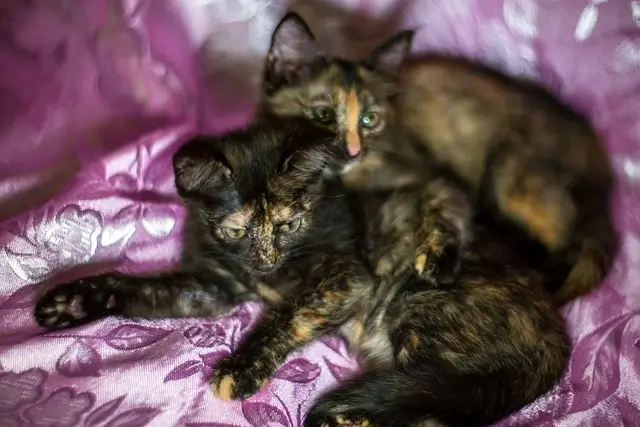
Tortoiseshell cats are affectionate, get along with other pets, and don’t pose much resistance as long as they don’t intrude on her space.
While these cats have high tolerance levels, they also have their boundaries, and you (and your other pets) will have to respect them.
This is what makes the cat’s personality so unique. He can be stubborn and aggressive and yet, at the same time, loyal and friendly.
Are Tortoiseshell Cats Friendly?
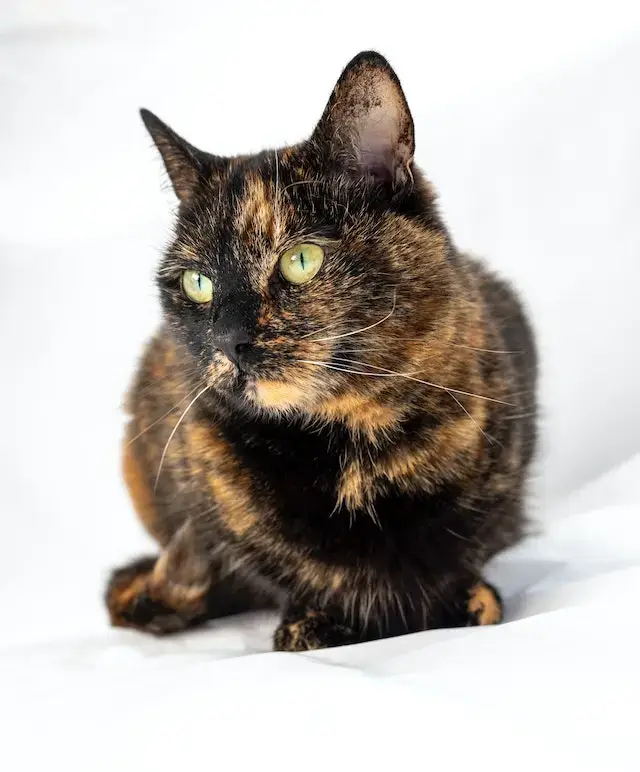
Yes, after all, why else would they so affectionately be called the tortie? These cats are highly energetic and vocal, so if you are about to own one, be ready for a lot of noise and mischief too.
These cats will need a lot of playtime and will keep you on your toes all day. Be generous with the cuddles, pats, and strokes because these cats love attention and can be very demanding with it.
They can be quirky and sassy, but they are also very affectionate, making them a favorite and winning fans from among your other kitties.
Must Read: Do Feral Cats Meow?
Are Tortoiseshell Cats Aggressive Towards Other Cats?
No, but they have their terms and conditions, which means they will be friendly to those who are nice to them. This holds even for other cats that you introduce to them.
Know that in the end, this is one cat with a quick temper, all cuddly one moment and then aggressive the next. Hissing and biting can be shared among these cats, and we hope you can now empathize with that.
They will need time to warm up, so go easy on them.
Do Tortoiseshell Cats Get Along With Dogs?
Yes, but all that was said above holds here, too, so make sure that you introduce them slowly and gently.
This could pose a challenge, and the caution lies with you because we all know how dogs are, with their waggly tails and endless licks.
Let him know that the little fellow will need some time as he is new.
What Factors Affect Cat Compatibility?
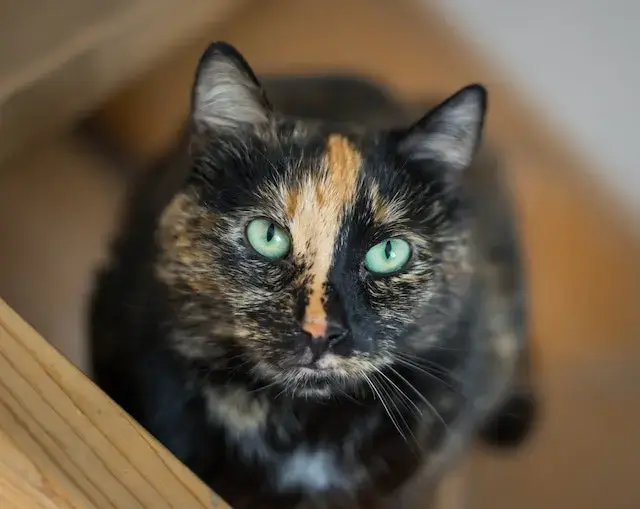
Cats sleeping next to each other is a pretty sight, and if you are adopting a second cat, this is what you had in mind. But whether or not this is going to happen is for you to read on and find.
- Age and socialization: They say that cats of the same age make the perfect match. However, if you already have an older cat, you can adopt a younger one, and vice versa, as this will bring out the maternal instincts of your older cat.
- Territory and personal space: This is more common when he has been the only cat in the family for a long time, but this can change over time. These cats won’t welcome the sudden intrusion and will need a reasonable amount of time and space.
- Breed-specific traits and behaviors: If you want two cats, consider breeds that get along with others, like the Abyssinian, British Shorthair, Bengal cat, Cornish Rex, Ragdoll, Persian cat, and Maine coon. Tortoiseshell, we are still determining.
- Past experiences and trauma: Cats that have had many negative experiences (more so when they were young) can be timid or shy around other cats. Give them some play time together, and they will soon get along.
- Personality and temperament: Some cats are more active and assertive, which may not be so bad but may pose a threat to a quiet and timid cat. This makes personality and temperament two things to consider when adopting a second cat.
Besides this, ensure you show no partiality, as this can divide your little cat’s family. Give them ample time to get along and play; you will see your dream scenario someday.
How To Tame A Tortoiseshell Cat?
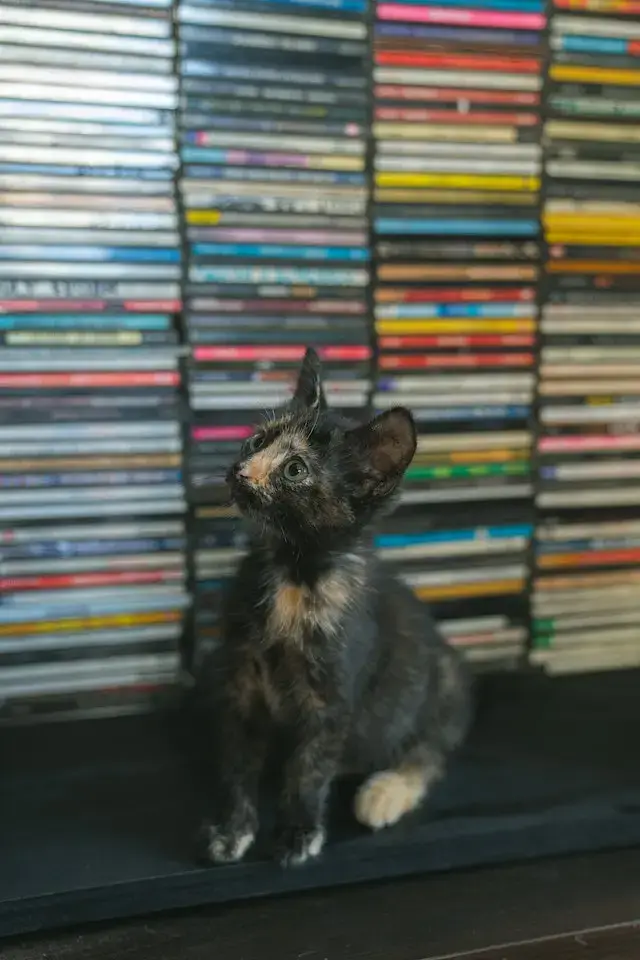
Don’t let this scare you. While the tortie needs a little taming, he is still an adorable pet, not a tiger coming to eat you. Start with the following, and he will soon bond with you.
- Gradual introduction process: Sudden introductions don’t just stress out a tortoiseshell but any cat. So, if this is a newcomer in your cat-friendly home, ensure the situation is under control and the cat crowd at home does not suffocate your tortie.
- Creating a safe and comfortable environment: Make sure that there is harmony in the household and a peaceful outdoor environment. Cats love hunting and entertaining themselves, and this is more so with the energetic tortie.
- Importance of patience and observation: The aggressive nature of the new tortie can sometimes lead him to bully the other cats. So, if you find your other cats hiding and cowering, you must separate the tortie from them for a while.
- Addressing potential conflicts and aggression: Do not physically detach them. Cats don’t like it and may swat you in the end. Instead, find something to distract them. You can clap, make some noise and do anything to divert their attention and entertain them.
- Positive reinforcement for building trust: Start with gaining their trust. Be gentle at all times. Try to find common ground. All this may be hard at first, but practice leads to perfection. Your cat has its own values and beliefs and wants to be understood.
- Establishing a routine: Food, playtime, litter, and sleep must be done from time to time. This may be difficult at first, considering the cat’s strong will and hot temper, but don’t give up, for this stubborn baby needs discipline.
Reading up until now would have been overwhelming, but don’t worry, you will get there someday. Look at your cute tortie, and you will no longer find any of this challenging.
Tips For Introducing Tortoiseshell Cats To Other Cats
| Steps | Description |
| 1. Prepare | Allow the cats to see each other through a gate or screen without physical contact. |
| 2. Scent Swap | Exchange bedding or toys between the cats to familiarize them with each other’s scent. |
| 3. Visual Contact | Allow the cats to see each other through a gate or screen, without physical contact. |
| 4. Gradual Introduction | Supervise short, controlled interactions, gradually increasing the time spent together. |
| 5. Monitor Progress | Observe the cats’ behavior and adjust the introduction process as needed. |
How Long Does It Take Cats To Get Used To Each Other?
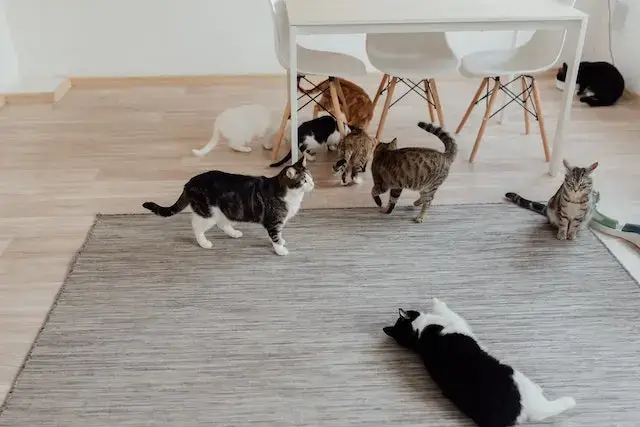
It’s going to vary. Depending on multiple factors, such as the age and temperament of the cats and how the introductions were conducted.
While some cats bond within a matter of weeks, some may take as many as twelve months, so you have to wait and see.
Meanwhile, do your best and stay positive, firmly believing that your tortie and other kitties will someday become best friends.
Are Tortoiseshell Cats Mean?
The fact about these cats is that they have a terrible cattitude; at least, that is what most findings reveal. Instead, they have what you would call a tortitude, which should not be surprising because most of them are females.
Their feisty, sassy, and headstrong nature gives them a distinct personality, but give them time and training, and they will be a wonderful addition to your family.
Cats are generally quiet and, unlike what most people say, don’t demand much. Give them their food and respect their territory, and they are happy.
Are Cats Happier With A Second Cat?
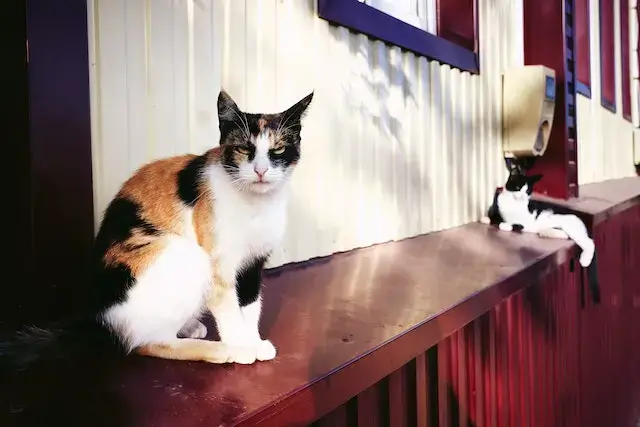
Your tortoiseshell has a weakness; she can get very jealous if she gets the impression that you have more love for the other cats.
Don’t let her aloof nature fool you, for she has her eye on you and will ensure she gets all the love she needs from you.
She will get loud and demanding, sometimes even to the point of fighting with your other cats, so make sure that the situation doesn’t lead to this.
How Loyal Are Tortoiseshell Cats?
He can be fiercely loyal and sensitive to your needs, giving him energy that can sometimes be annoying. He may follow you all day with his loud and demanding cries.
This energetic cat needs to be carefully supervised, even though he means well. He is going to want to help you with everything around the house.
It would be best if you found a way to tell him what he is doing is not always correct.
Recommended Reading: Are foxes canines or felines?
Do Tortoiseshell Cats Only Bond With One Person?
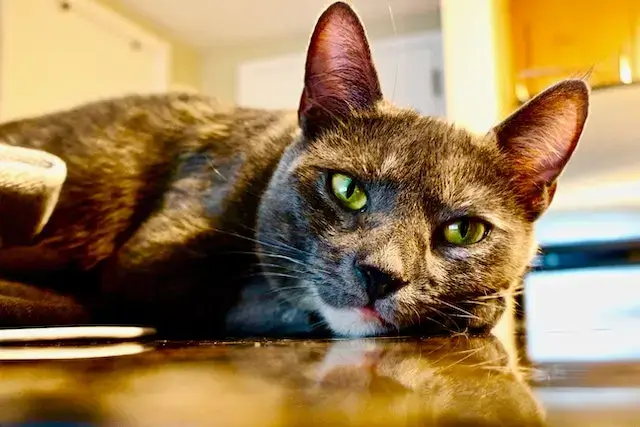
This is true not just in tortoiseshell cats but most cats. They are possessive and can never get enough of you, even if she has had you all day.
She will welcome love and attention from other pets and strangers, but at the end of the day, know that her first love is you.
Frequently Asked Questions
Q1. Tortoiseshell cat personality traits
Ans: These unique felines are known for their strong-willed, confident, and independent nature. Playful and affectionate, they often form deep bonds with their owners.
Q2. Tortoiseshell cat spiritual meaning
Ans: Some believe Tortoiseshell cats bring good luck and positive energy to their homes, and they’ve even been called “money cats” in certain cultures.
Q3. Do Tortoiseshell cats meow a lot?
Ans: Tortoiseshell cats can be quite vocal, but each cat is different. Some may meow more than others, mainly to communicate with their owners.
Q4. Do tortoiseshell cats like water?
Ans: These cats’ attitudes towards water may vary, similar to other breeds. Some may enjoy it, while others prefer to avoid it.
Q5. Are tortoiseshell cats rare?
Ans: Tortoiseshell cats are relatively rare, mainly due to their distinct coat markings. Most of them are female, with males accounting for around 1 in 3,000 tortoiseshell cats.
Q6. Are all tortoiseshell cats female?
Ans: Most tortoiseshell cats are females. However, occasionally a male is born, but they are very rare, usually sterile, and often carry genetic abnormalities.
Q7. Why are tortoiseshell cats always female?
Ans: This is due to genetics. The tortoiseshell pattern is linked to the X chromosome. Females inherit two X chromosomes, allowing for the mix of orange and black coloring that creates tortoiseshell’s unique patterns. Males, inheriting an X and Y chromosome, don’t typically display tortoiseshell traits.
Final Thoughts: Do Tortoiseshell Cats Get Along With Other Cats?
Living with a tortie is fun. Their strong will at hot temper can sometimes make them challenging to put up with, yet underneath that headstrong creature is a sensitive pet, fiercely loyal to her owner, and you are blessed if that is you.
A tortie is one of the best newbies you can give your cats for a playmate. All that he needs is a little training and time.

